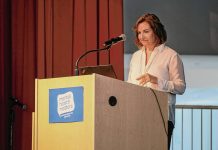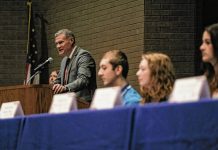When one member of the Islamic Society of Columbus Indiana heard initial reports of the Dec. 2 mass shootings during a holiday party in San Bernardino, California, one thought quickly came into his head: “Please don’t be Muslim. Please don’t be Muslim.”
As far as Zulkifly Yusuf said he is concerned, the husband-and-wife shooters police said killed 14 people and injured 22 — Syed Rizwan Farook and Tashfeen Malik — were anything but Muslim, despite their affiliation with the Islamic State group.
Yusuf, a former president of the local society, said he grows weary of hearing people killing and maiming in the name of his faith — and that includes the Nov. 13 shootings in Paris that killed 130 and injured nearly 400.
“These people can all call themselves Muslims all they want,” said Yusuf, a native of Malaysia. “But there is nothing in our religion and teaching that prescribes violence. In Islam, killing one innocent soul equals killing all of humanity.
[sc:text-divider text-divider-title=”Story continues below gallery” ]
“But there have been countless times that I have had to clarify with people that these (terrorism) attacks have nothing to do with true Islam.”
Yusuf is working with other local Muslims to organize a public forum, possibly for late January, to educate or remind the public about Islamic beliefs. They are doing so amid scattered reports of mosques worldwide being vandalized. Locally, however, there have been no incidents, according to the society.
Yusuf occasionally leads prayer at noon Fridays at the Islamic Center of Columbus, 2310 Chestnut St.
He recently stood among his fellow believers to remind even them that the tenets of the faith are peaceful — and that such a message should be spread to those around them. The latest reminder came Friday at the mosque.
The gathering also included the Rev. Wayne Hanrattie, a retired Presbyterian minister, who attended as a show of support.
“I just wanted to greet people and express concern,” Hanrattie said.
The 150-member local society includes Muslims from several continents and a range of countries such as Pakistan, India, Iraq, Egypt and N igeria. The Pew Research Center estimates that the faith boasts 1.6 billion followers worldwide — about a quarter of the world population — and more than 6 million in the United States, constituting about 1 percent of the population.
Hanna Omar, a spokesperson for the local Islamic assembly, speaks regularly about her faith. She recently visited IUPUC religion instructor Tim Orr’s class to talk about Islam and answer questions, including her reaction to acts of terrorism by groups claiming to be followers of Islam.
“These people are not representatives of Islam at all,” Omar said. “These people have their own agenda and ideology that stems from God-knows-what.”
Terrorism incidents traced to the faith give her another chance to enlighten others.
“I take them as an opportunity to open a discussion and dialogue with people,” Omar said. “I look for avenues to start a conversation. I understand that sometimes, people who haven’t heard much about Islam can be confused and wonder what is going on.”
Since she wears the traditional hijab head scarf, some people somehow assume her roots are in other lands. But Omar was born in New York City and sees herself as patriotic as any American. So she is especially disturbed by presidential candidate Donald Trump’s proposal to stop admitting Muslims to the United States.
“It definitely runs counter-intuitive to what America is all about and what this country was built on,” Omar said. “It almost reminds me of the Nazis and how they completely ostracized a group of people. I sometimes think some candidates want to say the most provocative things just to stay ahead in the polls.”
Indiana Gov. Mike Pence is one of more than 30 governors — all but one of them Republicans — who have sought to block the resettlement of Syrian refugees over security concerns following the deadly Paris attacks. But “calls to ban Muslims from entering the U.S. are offensive and unconstitutional,” the Columbus native said.
“Our Constitution guarantees the free exercise of religion,” he tweeted. “The U.S. cannot discriminate on the basis of religion.”
Columbus’ Arleen Keele believes it’s important for area residents to make time to hear from Muslims themselves about their beliefs and tenets. She organized a Sunday school class that met in 2011 for several weeks and introduced members of her First United Methodist Church to members of the Muslim community speaking about their beliefs and practices. It attracted as many as 60 people per week, including visitors from other churches.
Since then, First United Methodist confirmation and Sunday School classes have visited the local mosque several times for question-and-answer sessions.
“On any issue, and especially any controversial issue, it’s always important to see people as human beings such as yourself instead of some faceless object upon which it can be a lot easier to place prejudices or hatreds,” Keele said.
“I just want people to be willing to listen (on these issues),” Keele said. “We don’t have to come to the same conclusion.”
[sc:pullout-title pullout-title=”About Islam” ][sc:pullout-text-begin]
This is part of the Islamic Society of Columbus Indiana’s introduction to Islam on its website at scin.org.
“The literal meaning of Islam is peace; surrender of one’s will, i.e. losing oneself for the sake of God and surrendering one’s own pleasure for the pleasure of God.
“The message of Islam was revealed to the Holy Prophet Muhammad (peace and blessings on him) 1,400 years ago. It was revealed through angel Gabriel (on whom be peace) and was thus preserved in the Holy Quran. The Holy Quran carries a Divine guarantee of safeguard from interpolation and it claims that it combines the best features of the earlier scriptures.
“The prime message of Islam is the Unity of God, that the Creator of the world is One and He alone is worthy of worship and that Muhammad (peace and blessings on him) is His Messenger and Servant.”
[sc:pullout-text-end][sc:pullout-title pullout-title=”About the Islamic Society of Columbus Indiana” ][sc:pullout-text-begin]
Formed: In January 2006.
Members: About 150, from five continents and 25 nations. Many work with firms recruiting internationally such as Cummins Inc. and LHP Inc.
Mosque: At 2310 Chestnut St. in Columbus. Prayer meetings are at noon Fridays and are open to visitors.
Information: iscin.org.
[sc:pullout-text-end]




